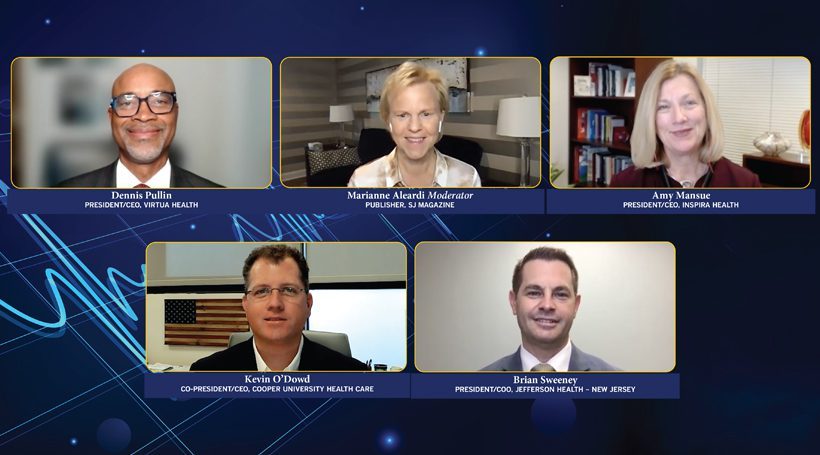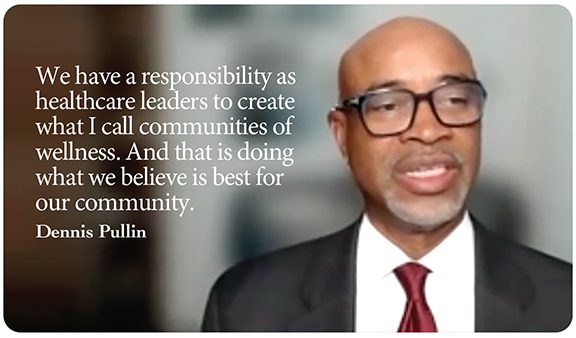Presented by
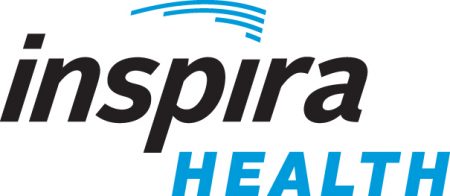
This is the third year we’ve hosted our Hospital CEO roundtable, and we were once again honored to have these distinguished leaders sit with us to discuss their important work. While many of us expected the world would be in a better place at this point, these executives understand what we’re all up against, and they know how their work impacts the health of so many.
We’re grateful to each of them for sharing their valuable insights. And we appreciate how they, and the many professionals they lead, continue to be dedicated to keeping us healthy and safe. Even when they are fatigued, and even when people argue against them, they just keep going – doing what it takes to improve the health of the people in South Jersey.
Participants:
Marianne Aleardi Moderator, Publisher, SJ Magazine
Amy Mansue,President/CEO, Inspira Health
Dennis Pullin, President/CEO, Virtua Health
Kevin O’Dowd, Co-President/CEO, Cooper University Health Care
Brian Sweeney, President/COO, Jefferson Health – New Jersey
On how we get back to normal
I don’t think normal will ever be what it was. But if you are fully vaccinated, and you’ve gotten your booster, your life will start to feel some kind of normal.
Amy Mansue
With all the tragedy and disruption caused by Covid, it’s logical to long for pre-pandemic days. The reality is, in many respects, we’re never going back to how things were. So I like to focus on the positive things that have changed: work from home, wearing masks in crowded settings during flu season, washing our hands and staying home when you’re sick. Those are good and positive changes, which I think are here with us for good.
Kevin O’Dowd
The good news in New Jersey is we’ve been a leader in vaccination efforts. When you look at the data, we’re in the top 10, thanks to a lot of hard work. But other states have low compliance. If you look at the reality of people traveling and intermingling throughout society when we have vaccination disparities across the country, it’s going to be really hard to get to the other side of this any time soon. So the quicker people get vaccinated, that’s the fastest way for us to get through this and back to normal.
Brian Sweeney
What will assist us in getting back to some kind of normal is people taking responsibility and doing what’s right. When we talk about wearing masks, when we talk about getting vaccinated, all of those things will help us reach a new normal. It’s really about having people take some responsibility to ensure public health.
Dennis Pullin
On the continued burden to healthcare workers
One of the biggest burdens has been on the mental health of our workforce – the stress, the burnout. Our biggest concern is how we provide our workforce with the necessary resources, either through professional counseling or encouraging them to talk with friends and other colleagues. We’re looking to help them let out some of the stress they have as a result of doing what they have to do every single day.
Dennis Pullin
One thing that is different about Covid is the prolonged period of time through which we’ve been working together on the recovery. Then we have another challenge, which is a national problem – the labor shortages. It’s just the perfect storm in terms of the clinical environment. It makes it very stressful, and all of us are working really hard to make sure our teams are supported.
Brian Sweeney
Our people are saying they’re feeling it everywhere, and then you add to that the increase in behavioral health patients, the increase in the number of patients who are non-Covid patients but are much sicker because they delayed care. It’s that perfect storm. They were already tired, and this is just piling on. So we’re trying to make sure we’re offering support and proactively saying, “Is there anything I can do?” We’re really trying to help them to take care of themselves, because what they’re experiencing is a lot.
Amy Mansue
There’s been no break in the action for 20 months. The volumes associated with Covid are still very much present, because the volume surge we all saw in 2021 had to do with care that was delayed. We’ve deployed resiliency teams for our team members, and we gave our team members outlets to tell their stories – many have published them or recorded videos – to try to get through a therapeutic process.
Kevin O’Dowd
On the nursing shortage
Part of the challenge is nursing education, because the number of people who have PhDs who can teach is limited. There are tons of applicants across the country, and no spots for them. This was an issue way before Covid, and it hasn’t been solved. The standards in nursing have also increased dramatically over the years. It used to be that you could have a diploma or an associate’s degree, and now just about everybody requires a bachelor’s degree. We’re trying to find ways to fill the pipeline differently than we have in the past. There are many things we can do, but it’s going to require some innovation.
Brian Sweeney
I think we all have tuition reimbursement programs so we can have a very different dialogue with individuals. We are saying, “Look, you’ve been in healthcare for a long time, how could we best support you to consider going back to school or getting your BSN? How do we walk that journey with you?” If they’re already working successfully in the organization, we want to help them take that next step.
Amy Mansue
A lot of individuals are choosing not to re-enter the workforce, and that is contributing to some of the challenges we’re having. But this is not a new thing. The shortages we’re dealing with are a decade old problem. I just think there’s a lot more attention being placed on it now because of the pandemic, but we have been dealing with this for a number of years.
Dennis Pullin
There’s this concept of YOLO – you only live once: so a nurse may think, I can go and spend part of the year in Florida and then part of the year in Arizona, so I can have different experiences. There was a national survey of some 5,000 employees across all different sectors, and a third said they plan to leave their job and move to a different part of the country. That could be a significant portion of our workforce. So it’s a real issue. It was an issue before Covid, and it’s been exacerbated over the last 20 months. As people think differently about how they want to live their lives, that is going to create challenges for us here.
Kevin O’Dowd
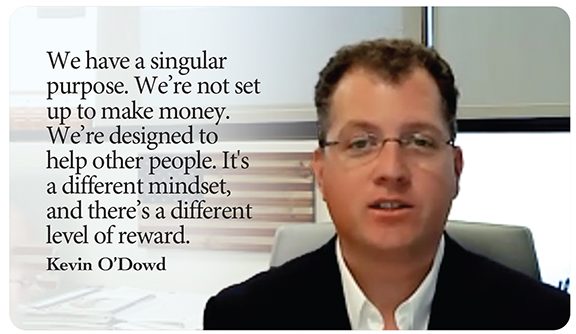
How the pandemic changed healthcare
One significant lasting change is the health systems of South Jersey are going to continue working together as partners. We’re not competitors. We’re all here to serve the people. The pandemic really put that in focus. And that mindset has prevailed, and I don’t see it changing anytime soon.
Kevin O’Dowd
Things changed at such a fast pace. Telehealth is a good example, because it took forever to get people to use telehealth and now everybody loves it. But we had to get it operational quickly. So clearly, we can move at a fast pace and be successful. The world is moving around us. We have to accept and manage it, so we can be successful in providing care in our community.
Brian Sweeney
The pandemic showed us that those who were vulnerable had even more of a challenge getting the help they needed. So we are now more mindful of how we can address these disparities and inequities in a much more assertive and aggressive way.
Dennis Pullin
We’ve all had to regroup on our strategic plans. We’ve taken the opportunity to really reaffirm where we’re headed. We’ve sped up some things we thought we’d be doing over a longer period. We’ve looked and changed some strategies based upon Covid and based upon some of the stresses that have been on the system. Our overall long-term strategy centers around being invested in the health of the community and understanding our role as an anchor institution in some of these very poor areas in Southern Jersey.
Amy Mansue
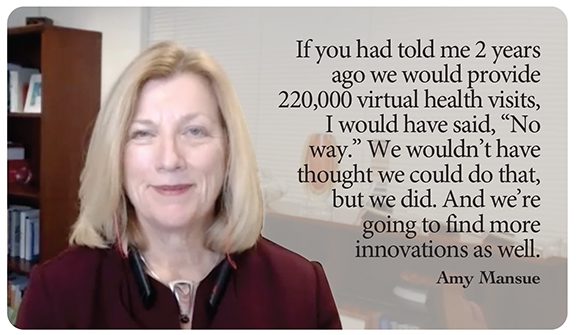
Virtual Medicine
The pandemic not only accelerated telemedicine options, it also helped people embrace this new virtual experience. We live in a digital age now, an on-demand world. One of the things we are working on is a concept called hospital at home. We recognize that with the tools and the technology we have we can safely treat certain patients in their own home, while still allowing clinicians to remotely monitor their progress. I think you will see many health systems start to look at not only how we get care close to home, but how we more effectively get care in the home.
Dennis Pullin
We recently launched a new technology called DAX, which is a form of artificial intelligence that allows interaction between the physician and the patient to be recorded and populated into the medical chart. We’re trying to remove barriers so the physician can spend more time looking a patient in the eye and not having to worry about trying to capture information into the electronic medical record. We’re an early adopter of that, and we want to help push that throughout the region, because we think it has a tremendous benefit in terms of improved health outcomes for our communities.
Kevin O’Dowd
The home monitoring program has escalated. The transformation of how we now do things we thought could only be done in the hospital has been significant. Anybody who can safely be monitored at home, we do that. If you had asked the doctors probably 3 years ago, they would have said, “No way, can’t be done.” But we figured it out. We’re innovating how we deliver care.
Amy Mansue
We introduced technologies during the pandemic to improve the safety of our organization. We introduced something called Strongline, which is a duress button where frontline care teams can activate it and it brings a team to the bedside to diffuse a situation quickly. A lot of times, that’ll be a therapist, a nursing supervisor, security and a psychologist. It’s a team-based model so care teams feel supported if they feel something escalating.
Brian Sweeney
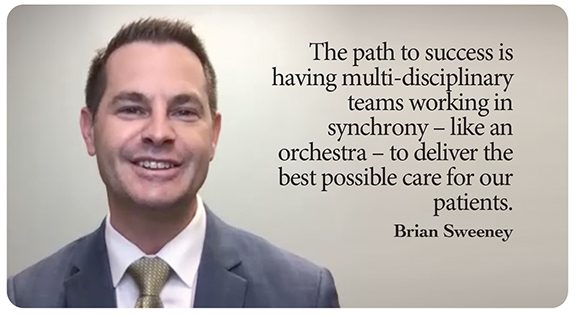
On supporting the community
After the mass shooting in Fairfield Township, the Cumberland County prosecutor put some of us in a room – police, healthcare, social services – and we engaged in conversations about how to teach safety to children, about what happens when you find yourself in a mass casualty situation. We also have active programs supporting soup kitchens and food pantries. The number of people in need is so much greater than it was before, and it’s going to take a while for people to recover. We’ve done all sorts of things and it’s still not enough for all the people who are in need, so this has gone to a higher level on our priority list. It’s always been important, but the need is so great now.
Amy Mansue
We’ve been taking a close look at cancer disparities in some underserved areas. We have a mobile screening van to make it convenient for community members – we go to them. The data still is kind of shocking when you take a look at the prevalence of cancer, so there’s been a lot of effort to work on promotion and awareness, but we still have a long way to go. We’re trying to make sure that hopefully we catch things early so people get treatment early and have a good outcome.
Brian Sweeney
For the last decade, we’ve been very active trying to improve the lives of our community – pushing for police reform, driving educational change in the K-12 space, being one of the first to jump to $15 an hour minimum wage. We’re excited about creating opportunities for people to advance their careers in healthcare, paying for folks to go back to school, paying for certificate programs. We’re very proud of what that impact is.
Kevin O’Dowd
I’m really pleased we have our mobile grocery store, which is a 40-foot store on wheels, where residents can get fresh, affordable foods where they are. We have mobile mammography and a mobile pediatric unit, all in an effort to take care into the communities and serve those folks who might not otherwise be able to come to us. Our mobile fleet addresses a major problem: healthcare access. Rather than expect folks to always come to us, we’ve found a way to meet them where they are.
Dennis Pullin
What they love about their jobs (still)
A man came up to me after church yesterday and said, “Are you the CEO of Inspira?” He then tells this wonderful story about how we saved his life. It’s special to be part of that. I’m honored, and I’m so grateful for the healthcare workers at Inspira and everywhere for what they’ve done and the sacrifices they’ve made this year. I love being part of an organization where really good people do great things every day.
Amy Mansue
I don’t just like my job, I love my job. Because I know we’re in a position to make a difference. But don’t get me wrong, leadership is hard. People rely upon you for their livelihood, to create an environment that is attractive for them to work in. It’s a heavy responsibility. But yet, the yields of the high points completely offset the low points. I show up every day with intention, and I try to make a difference.
Dennis Pullin
Our industry is going to be transformed, and I tend to be a person who likes change and likes to be creative and experiment with different things. This next phase of healthcare is likely to be disruptive. I’m very excited to lead and bring teams together to make an impact. Who knows how it’s going to turn out at this point, but it’s certainly a moment in our careers as leaders.
Brian Sweeney
Every day, I get up, I drive to work. I know I’m going to have a long, busy day. But I know that all those meetings, all those interactions, all those conversations, when you strip them all down, they’re designed to help other people. That’s meaningful to me.
Kevin O’Dowd


